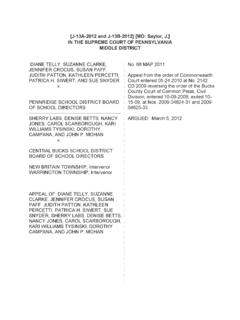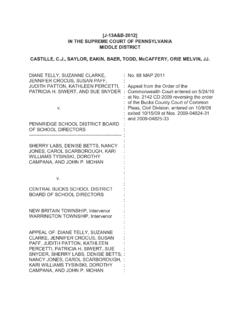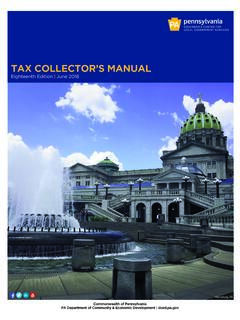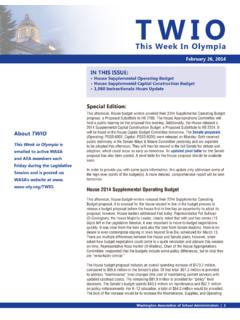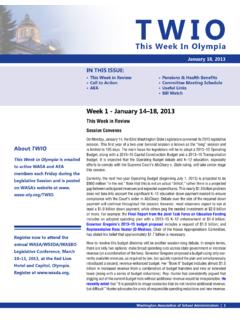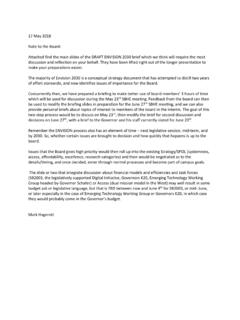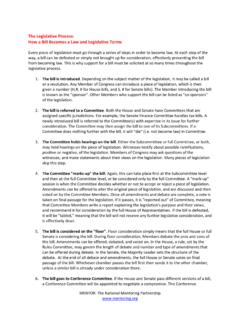Transcription of Tax Collection Testimony - pstca.org
1 Legislative budget and Finance Committee Pennsylvania s Current Real Property Tax Collection System Report Presentation by Maryann Nardone at June 28, 2011, Meeting Good morning. Senate Resolution 250 of 2010 directed the Legislative budget and Finance Committee to conduct a comprehensive study of the current property tax Collection system in Pennsylvania and other states. The resolution also directed us to consider the costs and benefits associated with consolidation of the Collection of current property taxes in the Commonwealth. We found that, in some respects, Pennsylvania s property tax Collection is al-ready consolidated, at the municipal level. Elected or appointed municipal collec-tors are typically responsible for collecting county, municipal, and school district property taxes.
2 Over 90 percent of Pennsylvania municipalities have elected or ap-pointed municipal tax collectors responsible for the Collection of property taxes. The General Assembly, however, has provided for some exceptions to consoli-dated property tax Collection by municipal collectors. Some counties are authorized to centrally collect county property taxes based on special legislation passed prior to the Civil War, while some others collect property taxes based on their home rule charters. The General Assembly has also provided for the temporary appointment of a tax collector in municipalities without an elected local collector until a collector is elected. We also identified 91 school districts that collect school property (and some-times other) taxes directly, and at least 26, often home rule, municipalities that con-tract with private firms to collect municipal property taxes.
3 We found that real estate taxes are less costly to collect than other taxes, as they have low compliance costs, involve relatively few transactions, and are there-fore not as labor intensive to collect as other local taxes. Overall, we estimated that the cost to collect property taxes across the state (75 percent of parcels statewide with Philadelphia and Allegheny Counties and certain municipalities excluded) to-tals about $55 million to collect about $12 billion in property taxes. This amounts to about one-half of one percent ( ) of revenue collected. In contrast, the cost to collect other local taxes, such as the local earned income tax, can easily be 10 times as expensive to collect, especially when costs are viewed as a percentage of revenue collected.
4 That said, however, we also found quite a bit of variation in the amount coun-ties, municipalities, and school districts pay to compensate tax collectors. In gener-al, jurisdictions that compensate tax collectors on a per bill basis for example, where the tax collector receives a set amount per bill collected have lower compensation costs that jurisdictions that compensate based on the tax collector s salary or as a percentage of the revenue collected. For example, we reviewed 44 counties and found that, in general, those coun-ties that collect their own property taxes and those that compensate local tax collec-tors on a per-bill-collected basis had the lowest average costs, at about $2 per par-cel.
5 In contrast, counties that compensate their tax collectors based on a flat per-centage of revenue collected had the highest average costs, over $8 per parcel. We should note, though, that the percentage of revenue method is used by counties for fewer than 2 percent of parcels statewide, and occurs mostly in rural areas. Costs vary not only by the method of compensation ( , on a per bill basis or as a percentage of revenue collected) but also by who collects the taxes. For exam-ple, although there are many exceptions, typically county property taxes collected at the county level, meaning centrally by county government employees, are the least expensive, at an average of $ per parcel, while compensation costs for local elected and appointed tax collectors are typically in the range of $3-$4 per parcel.
6 School districts that collect their own property taxes generally had higher costs, typ-ically in the range of $4-$7 per parcel. If potential savings similar to the savings identified for our samples could be realized by taxing districts across the state, we estimated that counties, municipalities, and school districts could potentially realize saving in the range of 10 percent for counties to 30 percent for municipalities, or about $10 million in compensation cost savings. As you can see, although these are high percentages, as mentioned earlier, the cost of collecting real estate taxes is relatively low, so even a 20 or 30 percent savings yields only relatively modest dollar savings.
7 Our estimate does not include Philadelphia or Allegheny Counties and per-tains only to the cost to compensate local tax collectors, but the point remains that, although there may be opportunities for significant savings for any given municipal-ity or school district, the savings on a statewide basis are relatively modest. Although the resolution asks us to focus on potential cost savings, the report also includes feedback we received from local tax collectors and others regarding the full range of advantages and disadvantages of Pennsylvania s system for collecting property taxes. For example, one reason the costs to collect property taxes are rela-tively low is that tax collectors do not receive benefits and are often responsible for their own office and equipment costs.
8 Local collectors also serve an important role as community liaison between taxpayers and their governments and often provide a range of consumer services that go well beyond those specified in statute. The disadvantages include, for example, the absence of qualifications for the office in most municipalities, with some who have been elected unable to obtain the surety bond required to hold the office. Tax collector training is voluntary, and not all taxing districts are willing to pay for costs associated with such training. When the sole person responsible for Collection becomes seriously ill or dies, it can create a lack of continuity and problems for taxing districts. Several taxing districts, how-ever, have identified ways to address some of these disadvantages, for example, by purchasing and introducing centralized computing and accounting systems for use by all taxing districts and tax collectors.
9 We also reviewed the property tax Collection systems used in our surrounding states and Illinois which, like Pennsylvania, has a substantial number of local gov-ernments. We found that Delaware, Illinois, Maryland, New Jersey, and New York were all similar to Pennsylvania in that they have local government municipal tax collectors. Using the municipal tax collector to collect property taxes for all taxing districts (county, school, and municipal), however, typically occurs only in Pennsyl-vania, Illinois, and New Jersey. Ohio and West Virginia are different in that they have county-based property tax collectors. In Ohio, all taxing districts are required to share in tax Collection costs of the county.
10 In Maryland, counties (which also operate school districts) and municipalities have the statutory option of adopting formal resolutions providing for routine county Collection of taxes on behalf of the municipality. We concluded that, if property tax Collection were to be consolidated at above the municipal level, the most feasible approach would to be to consolidate at the county level. The county is currently responsible for property assessments, fre-quently collects delinquent property taxes, and in general their Collection costs are lower than those of other taxing districts. Mandatory state consolidation of property tax Collection at the county level would be problematic, however, and could actually result in higher Collection costs for many municipalities and school districts.
